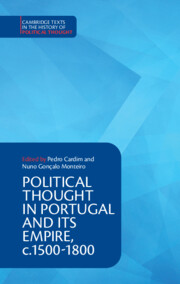Book contents
- Political Thought in Portugal and its Empire, c.1500–1800
- Cambridge Texts in the History of Political Thought
- Political Thought in Portugal and its Empire, c.1500–1800
- Copyright page
- Contents
- Acknowledgements
- Note on the Texts
- Introduction
- I. Political Thought, Empire and Global Rule
- II. Politics within a Catholic Framework
- Jurisdictional Politics within a Catholic Framework
- Revisiting Tacitus, Machiavelli and Botero
- Imperial Rule and Overseas Rivalry
- III. Political Thought in the Age of Enlightenment
- Bibliography
- Index
- Cambridge Texts in the History of Political Thought
Revisiting Tacitus, Machiavelli and Botero
from II. - Politics within a Catholic Framework
Published online by Cambridge University Press: 08 October 2021
- Political Thought in Portugal and its Empire, c.1500–1800
- Cambridge Texts in the History of Political Thought
- Political Thought in Portugal and its Empire, c.1500–1800
- Copyright page
- Contents
- Acknowledgements
- Note on the Texts
- Introduction
- I. Political Thought, Empire and Global Rule
- II. Politics within a Catholic Framework
- Jurisdictional Politics within a Catholic Framework
- Revisiting Tacitus, Machiavelli and Botero
- Imperial Rule and Overseas Rivalry
- III. Political Thought in the Age of Enlightenment
- Bibliography
- Index
- Cambridge Texts in the History of Political Thought
Summary
Dedicated to Prince Teodósio, heir to the throne, Suma política conveys a regalist understanding of kingship – that is, one advocating the sovereign’s total control over government matters. This included regarding politics as essentially a power struggle: Meneses praises executive action and pragmatism as qualities of good rulers; and accepts dissimulation, concealment and secrecy as tools to be used by the ruler. He also advises the prince to regard his vassals not as friendly collaborators, but as potential enemies and threats, one of the reasons why he insists that the ruler must have a thorough knowledge of his vassals. Apart from being cunning, the prince should be an extremely calculating person (instead of believing in the natural good inclination of all human beings, as Catholicism taught).
- Type
- Chapter
- Information
- Political Thought in Portugal and its Empire, c.1500–1800 , pp. 143 - 159Publisher: Cambridge University PressPrint publication year: 2021

